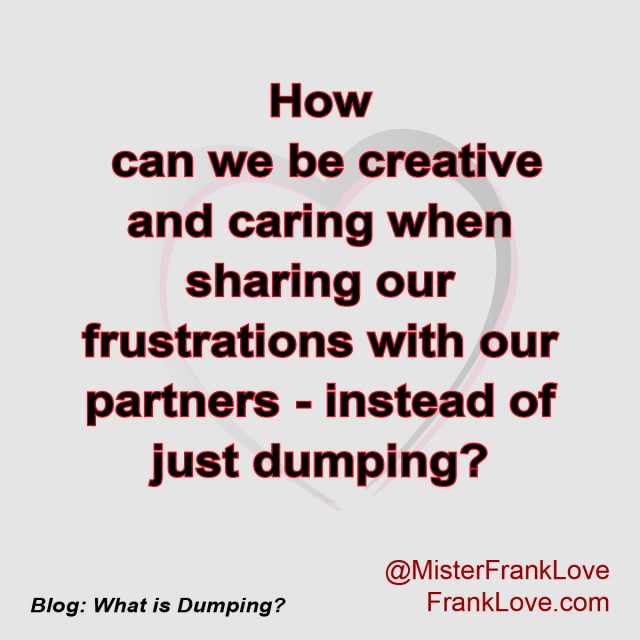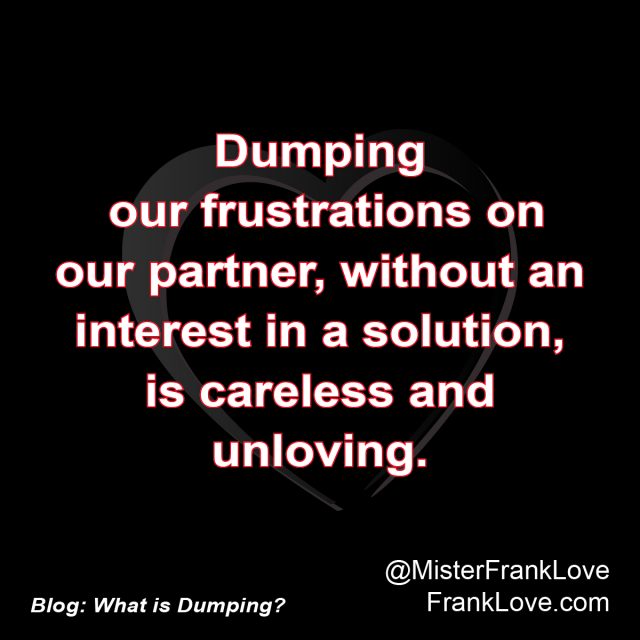In my previous blog “Is Our Sex Life Stale?” we raised the question of what we consider a normal sex life inside a loving relationship. Today’s blog post looks at dumping on our partner and why this is damaging to our relationships.
I can’t stand how you leave the grass clippings on the lawn.
I don’t like the way you do the children’s hair.
You drive like a crazy person!

Ever dump? If you’re like me, you probably have done so in your relationships.
We’re dumping when we unload our displeasure about something but display no interest in a solution. We are saying whatever we’re thinking—just to get it off of our chest.
There are two types of dumping: direct and indirect. Indirect dumping is when I unload my displeasure about something or someone other than my partner to my partner and have no interest in creating a solution. Direct dumping is when I unload my displeasure with my partner (or with something my partner did) to my partner without an interest in creating a solution. This blog will focus on direct dumping.
Imagine walking into a room where our partner is sitting and taking a shi+ in the middle of it. Afterward, we pull up our pants or drop our dress and walk out. Ahh. Relief. We feel better, and our partner is left with the shi+. This is what we’re doing when we verbally dump to our partner.
The problem with direct dumping is that it is an expression of carelessness. When we do it, we are showing our partner that we are interested in expressing and addressing our need(s) without consideration for the effect that doing so may have on them. As expressed in many Frank Love blogs: it is important that we take care of our partner all of the time—even when we’re irritated and inconvenienced.
Dumping is a problem. Most of us have dumped on our partner and been dumped on; and after being dumped on, few of us want to clean up the shi+. Even if we did the same thing to them yesterday. Since we know how unpleasant the experience is, let’s stop the unloving habit.
Here are a few steps toward that end:

- Self-Assess: Let’s notice when we dump. Let’s pay attention to how often we do it and the ways we lay verbal burdens on our partner with minimal or no interest in creating a solution.
- Be Compassionate: After a true self-assessment, we have probably determined that we dump or have dumped. Knowing that we would like compassion from our partner when we stumble, let’s give the same compassion to our partner when they dump. If and when they dump, let’s give them love and care. Let’s avoid responding in anger or with irritation.
- Shut Up: If we are not presenting a problem with an interest in collaborating to find a solution, let’s keep our mouths shut! Most of us have problems. Our partner probably has issues that they have at least considered dumping on us, but hopefully haven’t in an effort to create a loving culture in our relationship. Let’s work to be beacons of love and resolution by remaining quiet when we have no solution or interest in creating one. Identifying a problem is easy. Working on it takes more energy and commitment.
- Consider the Ancillary Factors: Let’s get creative and step up our game. We can assess the best time to talk to our partner about an issue that we are displeased with. Let’s consider how and where to talk to them. Let’s even ask ourself if the issue merits a discussion. Consider any factor that can contribute to having an effective conversation.
As for dumping comments, their anti-dump counterparts may look like:
- Can you rake the lawn clippings after you mow the lawn?
- Instead of perming the girls’ hair, would you get their hair braided?
- Would you slow down? Maybe we can leave earlier next time we have somewhere to go so we can drive more slowly instead of rushing?
Let’s pay attention to the debilitating behaviors we bring to our relationship. Some traits and actions have no place in a loving relationship. Dumping is one of them.
Keep Rising,
Frank Love
In my next blog post “Are You Glad I’m Home?” I will talk through why we need to participate in creating the experiences that we want in our loving relationships.
Watch Frank Love’s presentation “The Act of Caring.”
Subscribe to receive Frank’s weekly blog.
Become a sponsor of Frank Love and his work creating loving cultures in our relationships with a monthly contribution of as little as $2. Sign up today at Patreon.com/FrankLove.
–—–—–—–—–—–—–—–—–—–—–—–—–—–—–—–—––
Each week, Frank Love hosts Zoom support group meetings that assist women and men as we work to create a loving culture in our relationships. Calls occur from 7 p.m. to 8:30 p.m. EST and can be accessed by visiting FrankWeeklyCall.com.
- Tuesdays—Black Women: Creating a Loving Culture in Our Relationships
- Thursdays—Black Men: Creating a Loving Culture in Our Relationships
–—–—–—–—–—–—–—–—–—–—–—–—–—–—–—–—– –
Frank Love coaches individuals toward creating a loving culture in their family. He is also the author of Relationship Conversations You Don’t Want to Have (But Should Anyway) and 25 Ways to Be Loving. To schedule a free consultation, contact Frank at Frank@FrankLove.com.

